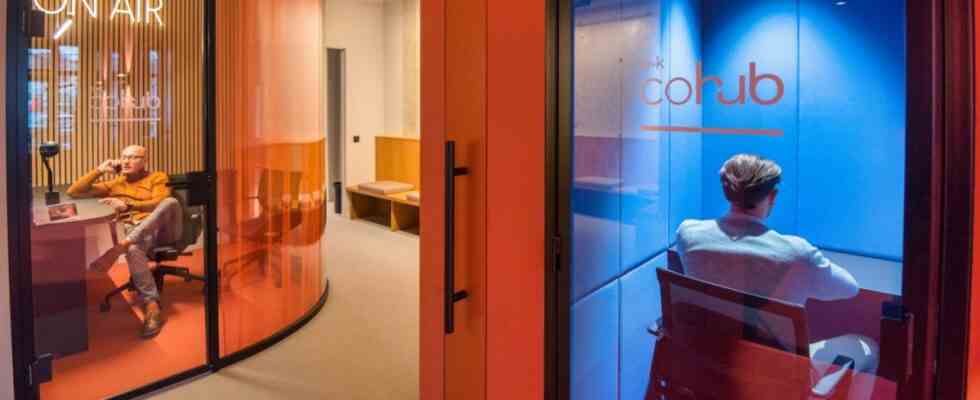“Together we will stand firm, divided we will fall,” says a free translation of a song by the US band “Canned Heat”, which was released in 1970 “Let’s Work Together” landed a top hit. Although the song was covered, the inventor is singer Wilbert Harrison. Bryan Ferry later made “Let’s Stick Together” out of it, and a petroleum company used the song for a commercial. But regardless of who set the song to music more beautifully: Cooperation is as old as humanity itself. A model for success that has a future again after the times of Corona, working from home, mask requirements and isolation – especially with regard to travel routes and place of work.
A new trend on the real estate market are so-called co-working spaces, a relatively young business idea. Shared office space like this is now also available for rent in Starnberg: this Monday, the project developer Ehrlicht und Klein is opening an innovative co-working office with an elegant design at Gautinger Straße 1d.
A chilled atmosphere, alone or in a team: Anyone who wants to concentrate on their work in the “e + k cohub” will find a place after registering online.
(Photo: Arlet Ulfers)
The “e + k cohub” was created on an area of 250 square meters at the headquarters of Ehrlich and Klein. The offer is aimed at the self-employed and start-ups, at digital nomads and companies, at seminar and coaching providers who rent workplaces or representative rooms for conferences, sales events or all kinds of events for up to 50 people alone or in a team by the hour, day or month would like. Michael Ehrlich, one of the company’s founders, enthuses: “The Cohub stands for a new form of working environment that not only inspires creativity, but also mutual exchange.”
With the offer, the makers want to create a space “in which people like to come together and exchange ideas about new projects or business ideas”. Ehrlich is convinced that this would not be possible at home or in isolated offices. It remains to be seen whether there is actually a need for this in Starnberg.
Michael Ehrlich, founder and member of the advisory board of the Starnberg project developer Ehrlich and Klein, believes in the success of his co-working space.
(Photo: Stephen Petrat)
A tour of the premises, which until a few months ago still housed a corona test station, confirms the high standards. Four different room types are on offer: a “relaxation lounge” with a comfortable sofa and work stations at coffee and high tables, tap-proof phone booths, two soundproof cabins (“glass cubes”) that are suitable for video conferences or recordings of podcasts, and a flexible Furnishable conference room with the latest communication technology, futuristic LED lights and high-end video and sound system. There are also drinks and free parking right in front of the door.
Hybrid workplaces: a professional alternative to a home office or company office.
Co-working spaces are showing enormous growth, also due to the corona pandemic. They were invented in San Francisco, California, quite some time ago. Since 2005 they have been seen as a development in the field of “new forms of work”. As so-called “third places”, hybrid workplaces offer a professional alternative to home offices or company offices. They are characterized by flexibility, independence and accessibility. According to the association, at the beginning of 2018 there were “Federal Association of Coworking Spaces“Only just over 300 offers, in May 2020 there were already 1268.
The association sees an “indicator for innovative collaborations and the development of personal networks” in multifunctional meeting rooms. The number may have multiplied by now. In the “German Coworking Federation” (GCF) is struggling with concrete figures, but a trend is recognizable: After the initial hype in the big cities, “rural areas are now catching up”, says GCF board member Christian Cordes, citing the “Village Community House 4.0” as an example: multifunctional and modernly equipped buildings for different interest groups in the countryside. However, the term co-working is not clearly defined, there is no DIN standard. So in the broadest sense, it could also be a hotel lobby, an extra office or even a quiet corner in a café with WiFi are considered co-working spaces.
Ehrlich and Klein have opened the first co-working space in Starnberg. Julia Bauer is the contact person responsible for the company’s newest line of business.
(Photo: Ehrlich and Klein)
It remains to be seen whether the offer from Ehrlicht and Klein will pay off. The “multiple office” is a pilot project that may also be recommended for other locations. “The potential for Starnberg is there,” Ehrlicht believes. His innovative company, which sometimes shines with unconventional projects such as the pink “cradle” at the See train station, says it has invested half a million euros in the “Cohub”. A utilization of 50 percent “would be good”. The daily fee for individuals costs 30 euros, the monthly fee 400 euros. Bookings are made over the Internet, the tariffs can be found on the homepage at [email protected]. Cohub manager Julia Bauer is available to answer any questions.
That Ehrlicht and Klein are playing the outdated rock classic of all things at the opening canned heat play is unlikely. But it wouldn’t be inappropriate, the translation says: Make someone happy, let them laugh, let’s work together and make life worth living. Come on, come on – let’s work together.

